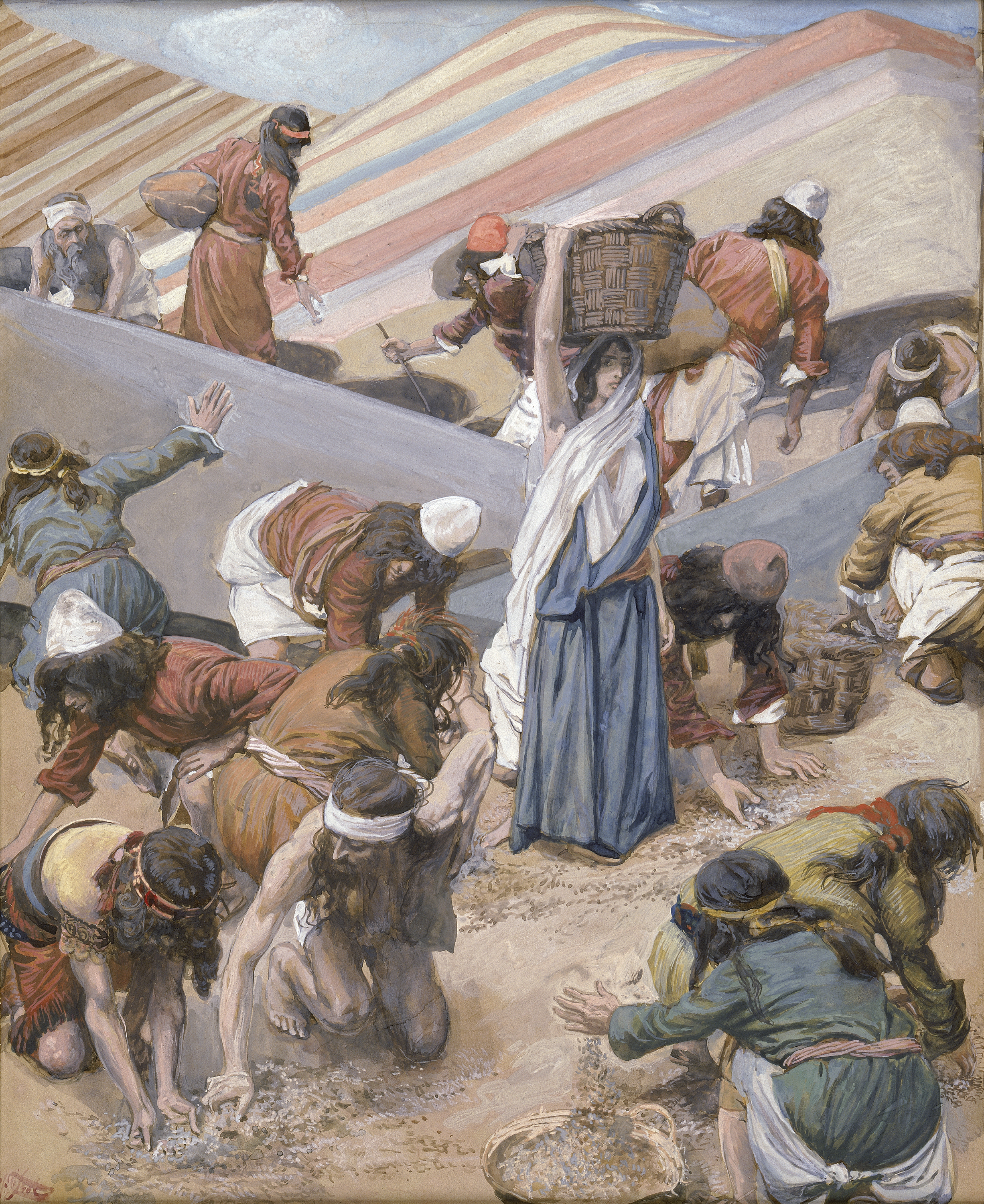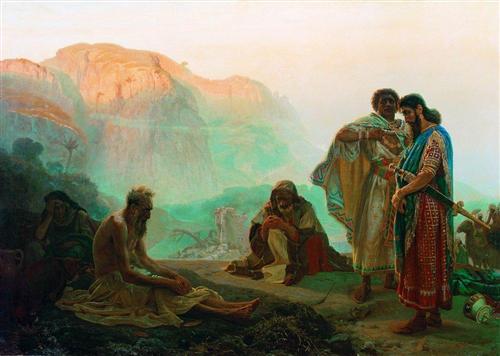
“A woman playing a psalterion,” an instrument used to accompany psalms…
This feature focuses on the psalm for the upcoming Sunday and on highlights from the psalms in the Daily Office (DORs) in the week leading up to that upcoming Sunday. The general idea is to review the next Sunday’s readings on the prior Wednesday, and review the psalms from the Daily Office Readings for the week ending on the Tuesday just before that “prior Wednesday.”
For example, The Lectionary Page psalm for Sunday, September 28 is Psalm 78:1-4, 12-16. In turn, the DOR psalms highlighted in this post will be from the readings for Wednesday, September 18 (“more or less”), up to the readings for Tuesday, September 23.
Psalm 78 will be discussed below, but first here are some highlights from last week’s DORs.
Going back to Thursday, September 18, the DORs for that day included Psalm 71:18:
And now that I am old and gray-headed, O God, do not forsake me, *
till I make known your strength to this generation
and your power to all who are to come.
Which pretty much sums up how this blog got started. (Incidentally, some translations label this psalm “The Prayer of an Elderly Person,” but I wouldn’t go that far…)
Which is being interpreted: If the person who wrote Psalm 78 – or any other psalm – were alive today, he’d probably “get the word out” through a blog like this.
The DORs for Friday, September 19, included Psalm 69, verses 10 and 23. Psalm 69:10 reads, “Zeal for your house has eaten me up…” That passage was quoted by the Gospel writer in John 2:17, in the King James Version (the one God uses), “And his disciples remembered that it was written, ‘The zeal of thine house hath eaten me up.'” This was right after the Wedding at Cana, when Jesus went into the Temple in Jerusalem, and proceeded to clean out the place with a whip of cords, driving out money-changers, publicans and the like. (See also Romans 15:3.)
Psalm 69:23 reads, “They gave me gall to eat, and when I was thirsty, they gave me vinegar to drink,” which foreshadowed Jesus on the cross. See Matthew 27:34 There they offered Jesus wine to drink, mixed …, and also Sour Wine and Gall: Was it a Merciful Gesture or Mockery? – …, which noted in part, “Offering sour wine combined with gall … may have been a medicinal and merciful gesture to dull the intense pain; but St. Luke in his Holy Gospel implies that the drink offered to our Lord Jesus at His crucifixion was part of the torture.”
The DORs for Sunday, September 21 included Psalm 96:1, “Sing to the Lord a new song,” about which much has been written herein. For examples, type “sing Lord new song” in the search box above right and you’ll get links like On “what a drag it is. . .” (alluding to the Rolling Stones song, Mother’s Little Helper). That post noted in part, “now that I’m ‘old and full of years’ – I [was] 62 – I can clearly see that ‘getting o-o-o-o-o-o-o-o-ld’ beats the heck out of the alternative.” (Which could also qualify as the “prayer of an elderly person.”)
And finally, the DORs for Tuesday, September 23, included Psalm 78:2, “I will open my mouth in a parable; I will declare the mysteries of ancient times.” On that note, Jesus specialized in the parabolic method of teaching – of teaching through the use of parables – a method discussed in On three suitors (a parable). That included a discussion of the problems inherent in trying to “strictly” or “conservatively” interpret a parable, as some try to do.
Turning to the psalm for Sunday, September 28, Psalm 78:1-4, 12-16, the first part – including Psalm 78:2, noted above – begins with a note of praise, and of our duty to future generations:
We will recount to generations to come
the praiseworthy deeds and the power of the LORD, *
and the wonderful works he has done.
Which means of course that it is in God’s best interest to have His followers succeed in life, but oh does God love His drama, as noted in Psalm 50:15, “Call upon me in the day of trouble; I will deliver you, and you shall honor me.” (The “honor” seems to be the flip side of the “trouble.”)
The International Bible Commentary (IBC) said that Psalm 78 was about “the lessons of history,” and despite how short this Sunday’s reading is, “78” is one of those psalms that is so long that it got divided in two. It has 72 verses, and verses 12 through 16 are about “Grace abounding,” according to the IBC. Specifically, these five verses recite “the plagues in Egypt, the crossing of the Red Sea, guidance through the wilderness by cloud and fire, and the provision of water at Rephidim (Exod. 17:6) and Kadesh (Num. 2010 f.).”
Which leads to the valuable lesson: There’s a big difference between “arguing with God” – see On arguing with God – and “deliberately challenging God,” or defying Him, or being too skeptical about His ability to “deliver us from evil,” as detailed in Psalm 78.

The upper image is courtesy of Psaltery – Wikipedia, the free encyclopedia, with the full caption: “A woman playing a psalterion. Ancient Greek red-figured pelike from Anzi, Apulia, circa 320–310 BCE.”
The lower image is courtesy of Psalms – Wikipedia, the free encyclopedia, with the full caption: “David Playing the Harp by Jan de Bray, 1670.”
As to David playing the harp, see David – Wikipedia, the free encyclopedia, which noted the account of First Samuel, Chapter 16, which told of Saul, the first-ever king of Israel, being tormented by an evil spirit. In turn it was suggested that “he send for David, a young warrior famed for bravery and his lyre playing. Saul did so, and made David one of his armor-bearers. From then on, whenever ‘the spirit from God came on Saul, David would take up his lyre and play. Then relief would come to Saul; he would feel better, and the evil spirit would leave him,’” as illustrated above.
My way or the highway – Wiktionary defined the term as “suggesting an ultimatum which indicates the listener(s) will either conform to the desires of the speaker or else be excluded.”
As to “get the word out,” see Get the word out – Idiom Definition – UsingEnglish.com, “If you get the word out, you inform or let people or the public know about something.”
As to deliver us from evil: The Lord’s Prayer “concludes with ‘deliver us from evil‘ in Matthew, and with ‘lead us not into temptation’ in Luke.” See Lord’s Prayer – Wikipedia, the free encyclopedia.
* * * *
As to Book of Psalms generally, it is “commonly referred to simply as Psalms or ‘the Psalms’ … the first book of the Ketuvim (‘Writings’), the third section of the Hebrew Bible. The English title is from the Greek [word] meaning ‘instrumental music’ and, by extension, ‘the words accompanying the music.’ There are 150 psalms in the Jewish and Western Christian tradition.” Psalms – Wikipedia, the free encyclopedia… The book is “divided into five sections, each closing with a doxology (i.e., a benediction) … probably introduced by the final editors to imitate the five-fold division of the Torah.”
Wikipedia added that the “version of the Psalter in the American Book of Common Prayer prior to the 1979 edition is a sixteenth-century Coverdale Psalter. The Psalter in the American Book of Common Prayer of 1979 is a new translation, with some attempt to keep the rhythms of the Coverdale Psalter.”
For another take on the psalms in general, type “Thomas Merton” in the Search Box above right.


 An image of “the eleventh hour,” referring to a point in time “nearly too
An image of “the eleventh hour,” referring to a point in time “nearly too 








